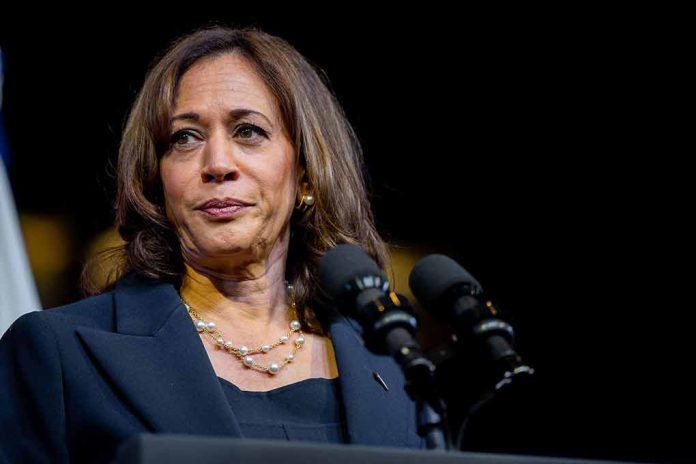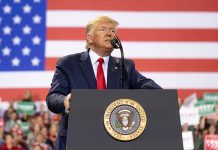
Vice President Kamala Harris proposes a steel policy reminiscent of Trump’s approach, vowing to keep U.S. Steel under domestic ownership.
At a Glance
- Harris announces plan to keep U.S. Steel domestically owned and operated
- Policy aligns with Trump’s earlier stance and Biden’s March statement
- United Steelworkers union supports the policy, citing national security concerns
- Harris adopts other Trump-like policies, including child tax credit and no taxes on tips
- Both Harris and Trump campaign on protecting American jobs and unions
Harris Echoes Trump’s Protectionist Stance on U.S. Steel
In a move that mirrors former President Donald Trump’s approach, Vice President Kamala Harris has announced a steel policy aimed at keeping U.S. Steel under domestic ownership. The announcement, made during a campaign stop in Pittsburgh, Pennsylvania, underscores a growing bipartisan consensus on the need to protect American manufacturing and jobs in the face of global economic pressures.
“US Steel is an historic American company, and it is vital for our nation to maintain strong American steel companies,” Harris said. “… US Steel should remain American-owned and American-operated.”
This stance aligns closely with President Joe Biden’s statement from March, where he emphasized the importance of U.S. Steel remaining an American company. It also echoes Trump’s opposition to the potential sale of U.S. Steel to Japan’s Nippon Steel, which he voiced earlier in January.
Bipartisan Agreement on Protecting American Industry
The policy highlights a rare point of agreement between the current administration and Trump’s approach to trade and industry. Both parties seem to recognize the strategic importance of maintaining a strong domestic steel industry for economic and national security reasons. The United Steelworkers union, based in Pittsburgh, has welcomed Harris’s stance, believing it will protect national security and preserve union jobs.
On behalf of the American people, I thank Joe Biden for his extraordinary leadership as President of the United States and for his decades of service to our country.
I am honored to have the President’s endorsement and my intention is to earn and win this nomination.
— Kamala Harris (@KamalaHarris) July 21, 2024
However, Nippon Steel remains confident that a regulatory review will support the merger, arguing it would strengthen U.S. Steel and the American steel industry. The Committee on Foreign Investment in the United States is currently reviewing the national security implications of the proposal and will make a recommendation to the president, who holds the final decision.
Harris Adopts Trump-Like Economic Policies
Beyond the steel industry, Harris has adopted several policies that bear resemblance to Trump’s campaign promises. These include proposing no taxes on tips for service and hospitality workers and introducing a child tax credit. Harris’s child tax credit proposal includes a maximum of $6,000 in tax breaks for middle- and lower-income families with children in their first year of life, and she aims to restore Biden’s American Rescue Plan’s extended child tax credit of $3,600 per child.
“We are fighting to build an economy that works for all working people. That has always been the vision of the labor movement and that is the vision of our campaign,” Harris said.
These policy adoptions have not gone unnoticed, with Trump accusing Harris of copying his policies and criticizing her on social media. Despite the similarities, Harris is positioning herself as a break from divisive politics and aims to move beyond the Biden era while remaining loyal to the administration’s core policies.
Implications for the 2024 Election
As both Harris and Trump campaign on protecting American jobs and supporting unions, the steel policy debate could play a significant role in swing states like Pennsylvania. Harris’s campaign has reportedly energized voters in the state, with increased volunteer sign-ups. Her focus on issues such as capping prescription drug costs, defending the Affordable Care Act, and growing the economy from the “bottom out and the middle up” aims to appeal to working-class voters.
The upcoming debate between Harris and Trump is expected to further highlight their policy similarities and differences. As the election approaches, the ability of both candidates to convince voters of their commitment to American workers and industry will likely be a decisive factor in key battleground states.
Sources
- Kamala Harris announces steel policy — the latest move ripped from Trump’s playbook
- Harris and Trump pitch to American workers on Labor Day
- Kamala Harris Says U.S. Steel Should Stay American-Owned
- Kamala Harris Calls for U.S. Steel to Remain American Owned
- Harris set to oppose sale of US Steel to a Japanese firm during joint Pennsylvania event with Biden














